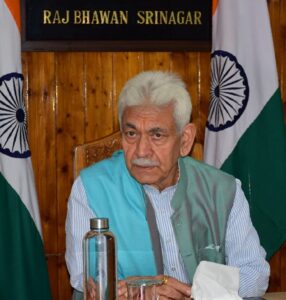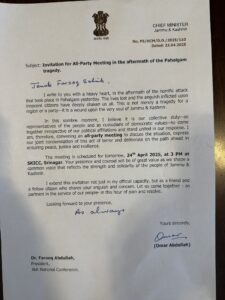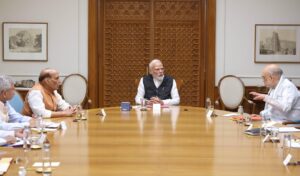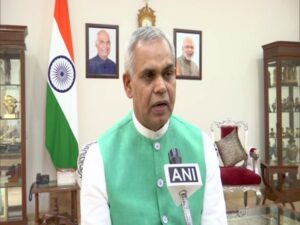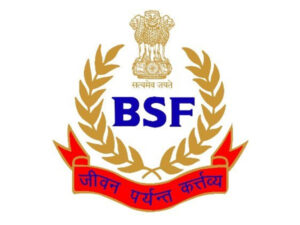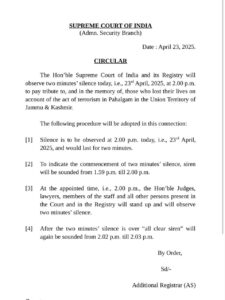Haryana judiciary paper leak: Delhi court convicts 3 including officer, acquits 6
New Delhi [India], August 23 (ANI): The Rouse Avenue court convicted three accused persons in connection with the Haryana judicial exam paper leak case of 2017.
The then Registrar (Recruitment) Balwinder Kumar Sharma along with two aspirants is among the convicted individuals. The case relates to the judiciary exam conducted by the Haryana Public Service Commission in collaboration with the High Court of Punjab and Haryana in 2017.
A few days after the preliminary exam, there were allegations of a paper leak and the High Court of Punjab and Haryana on due consideration of the facts, events and evidence
formed an opinion that a regular case should be registered and the matter be investigated in depth.
Success is a journey that involves hard work, continuous learning and courage to keep going despite challenges. This case reminds us of a famous quote There are no shortcuts to success, the court said in the judgement.
This case is a classic example of the fact that shortcuts usually lead to disappointment. The option of short-cut generally brings you to a place where you never want to reach, the court added.
Principal District and Sessions Judge Anju Bajaj Chandna convicted Dr Balwinder Kumar Sharma, Sunita and Sushila.
“I hold that the prosecution has been able to prove its case through circumstantial evidence against accused Sunita, Balwinder Kumar Sharma and Sushila,” the Distinct Judge said.
The court convicted Sunita and Balwinder Kumar Sharma for the offences punishable under Section 120-B IPC read with Section 409 IPC and Section 13(1)(d) of Prevention of Corruption Act 1988 and substantive offence punishable under Section 411 IPC is made out against the accused.
The court has convicted accused Sushila for the substantive offence punishable under Section 411 IPC. These accused persons have been acquitted for the offences under Section 420 IPC and Sections 8 and 9 Prevention of Corruption Act 1988 and Section 201 IPC. However, the court acquitted six accused persons of all the charges against them.
“For remaining accused persons, the circumstantial evidence or its chain is not sufficient and complete and hence, the prosecution has failed to prove their culpability beyond reasonable doubt,” the court said.
As a result, accused persons Ayushi, Sunil Kumar Chopra alias Titu, Kuldeep Singh, Subhash Chander Godara, Sushil Bhadu and Tajinder Bishnoi were acquitted in the present case, the court ordered on August 22.
“Before parting work the judgment, I would like to record that paper leaks have far-reaching consequences leading to detrimental effects on candidates. It creates an atmosphere of unrest, stress and anxiety among the students and affects their motivation to excel academically,” the judge observed.
The court pointed out that In a country, where unemployment remains a constant worry, the paper leak menace adds to delays in recruitment adversely affecting the efficiency of government departments and administrative agencies, which are already dealing with the issue of less human resources.
“These days, crime is committed through organized rackets comprising of players from across the education sector, people involved in formulating question papers, coaching centres, consultants, hired agencies and printing presses,” the court said.
The court also expressed the need for stringent laws and said “To restore the faith in the process of examination, the issue of paper leaks has to be dealt with by effective implementation of specific stringent laws.”
The court appreciated the notification of the Public Examination (Prevention of Unfair Means) Act 2024, which is a welcome step in this direction but preventive measures against such malpractices must be put in place by introducing long-term reforms. The aim and objective must be to bring greater transparency, fairness and credibility to public examinations, it added.
The court said that the process of examination is designed to select the best talent by way of fair assessment. Equality, sanctity and integrity are the hallmarks of the system of competitive exams.
The facts of the case are that the Haryana Public Service Commission, Panchkula, invited online applications for 109 posts of Civil Judge (Junior Division) in the Haryana Civil Service (HCS) (Judicial Branch) Examination 2017 through Advertisement of 2016 dated March 20, 2017. The HCS (JB) Examination was to be conducted in three stages namely preliminary examination, main Examination and viva voce.
The preliminary examination of HCS (JB) 2017 was conducted on July 16, 2017, at different examination centres.
On July 19, 2017, a complaint addressed to DGP, Haryana Police was preferred by Manoj (husband of Suman, who was one of the candidates of the HCS (JB) Examination). A similar complaint was also presented before the High Court of Punjab and Haryana on July 20, 2017, alleging leakage of question paper through candidates namely Sunita and Sushila.
The complaint was marked to the Recruitment Committee. On August 8, 2017, Suman also filed a petition before the Punjab and Haryana High Court wherein she reported that the HCS (JB) Examination paper was leaked.
Petitioner (Suman) specifically named Sushila and Sunita for having the question paper of the HCS (JB) Examination and for having offered to sell the same for Rs 1.5 crores and also after negotiations settled for Rs 10 lakhs for the preliminary examination question paper.

